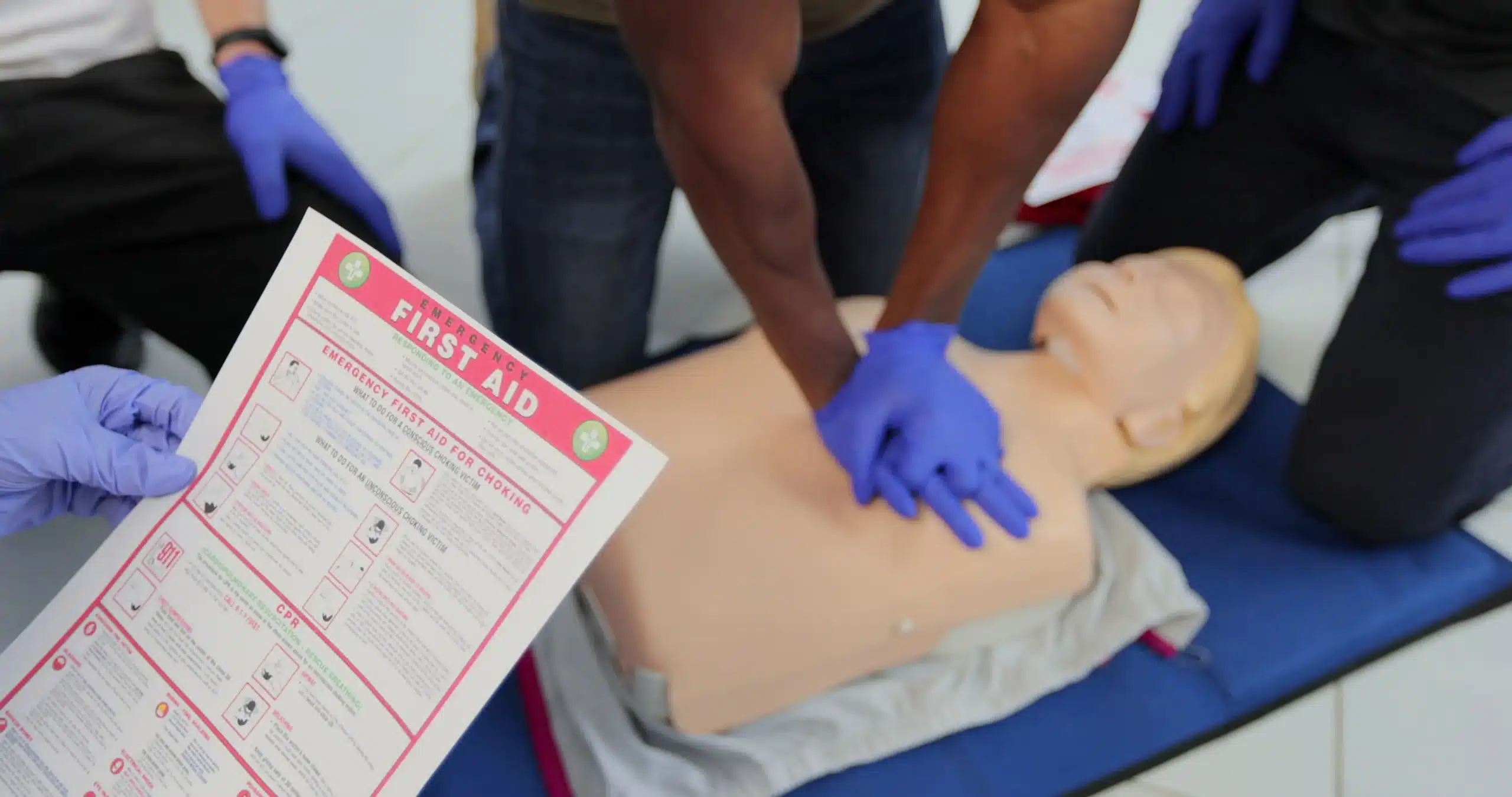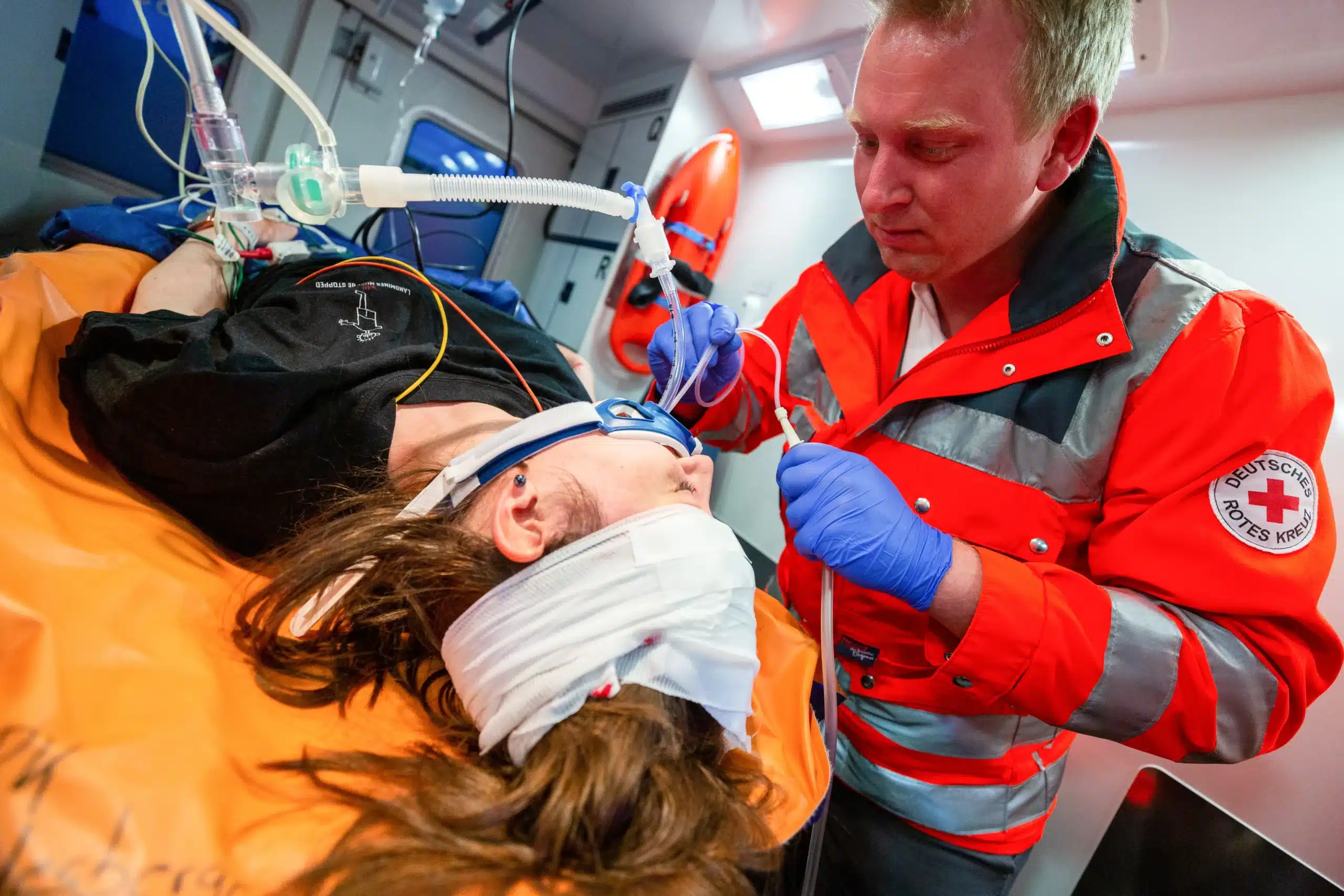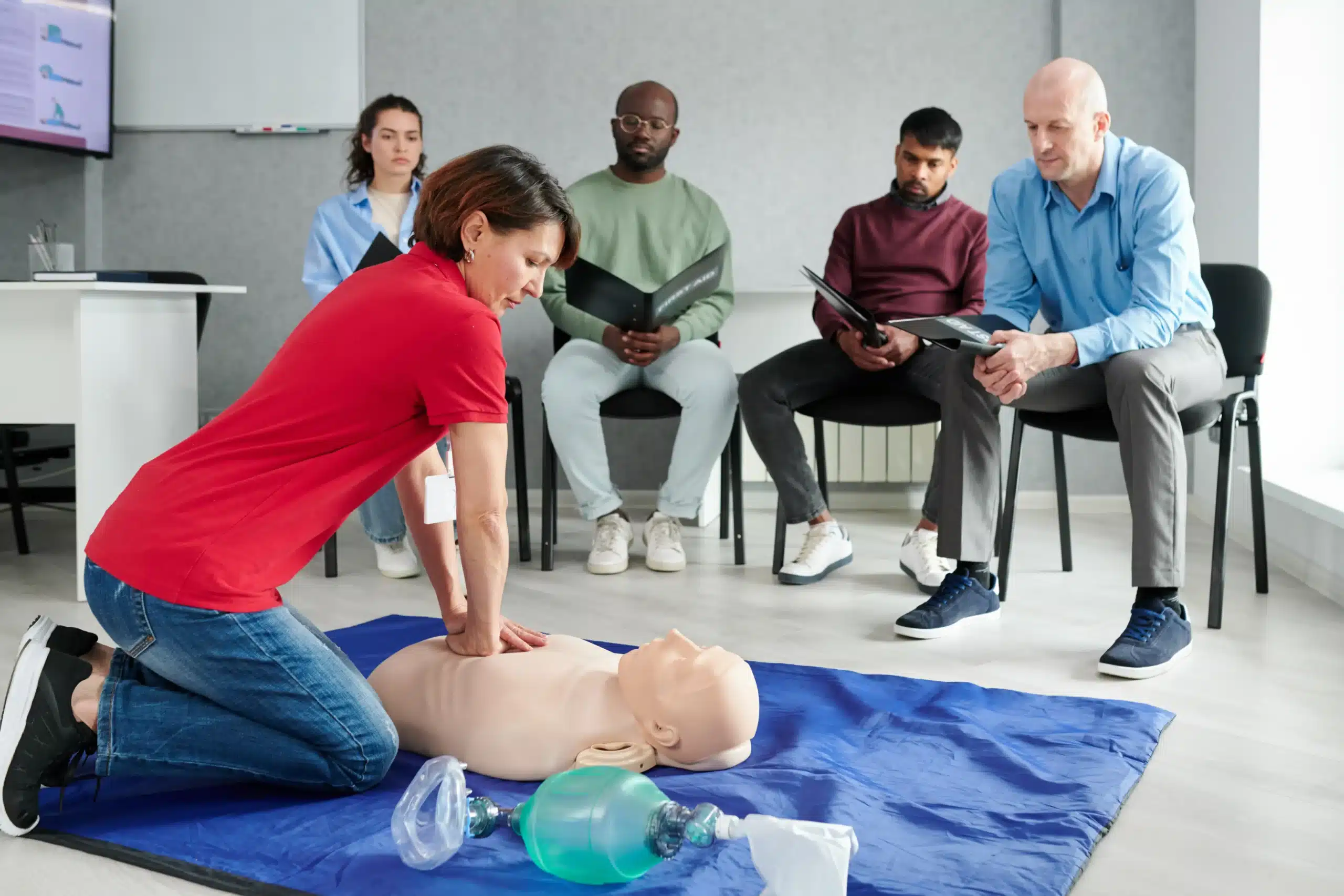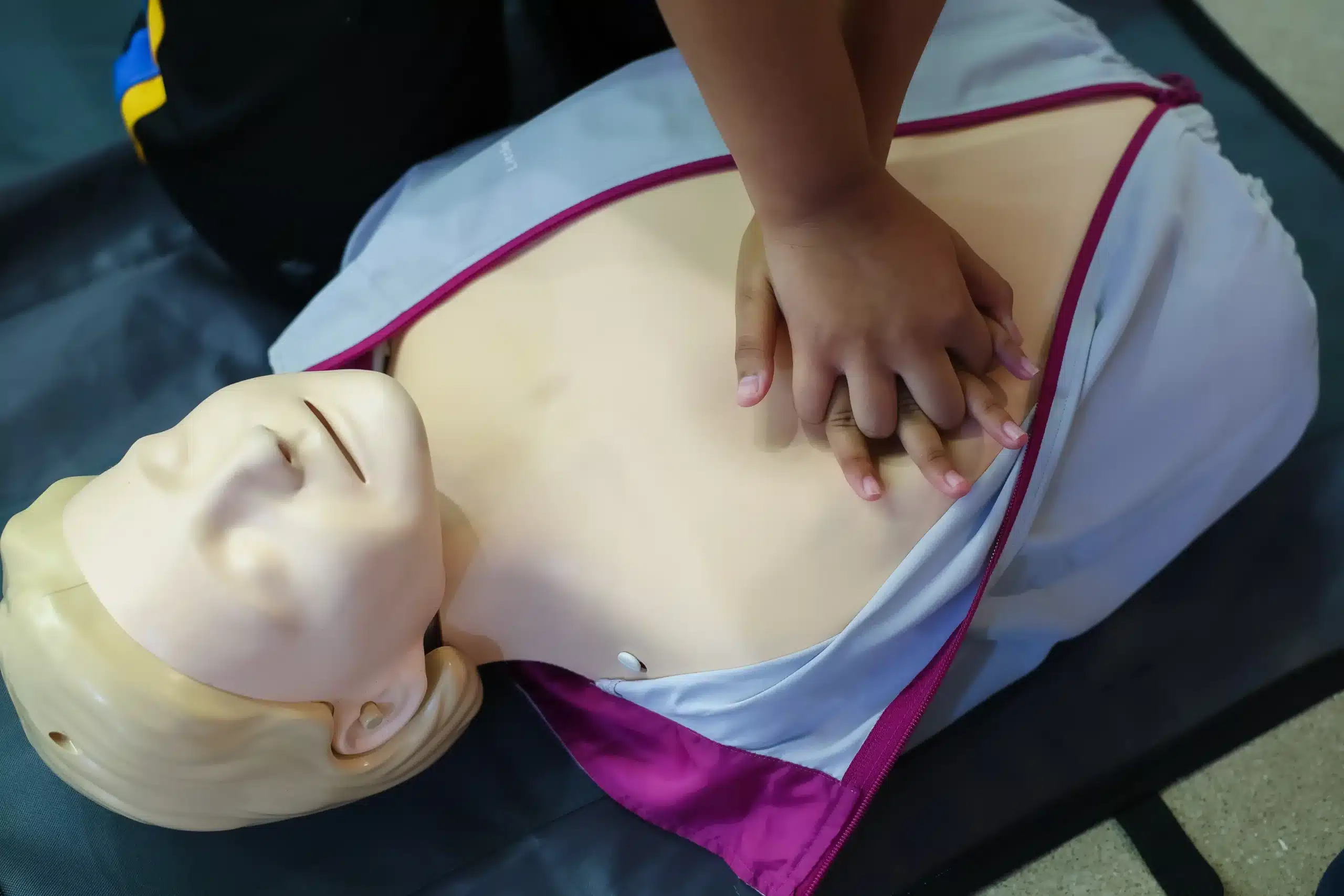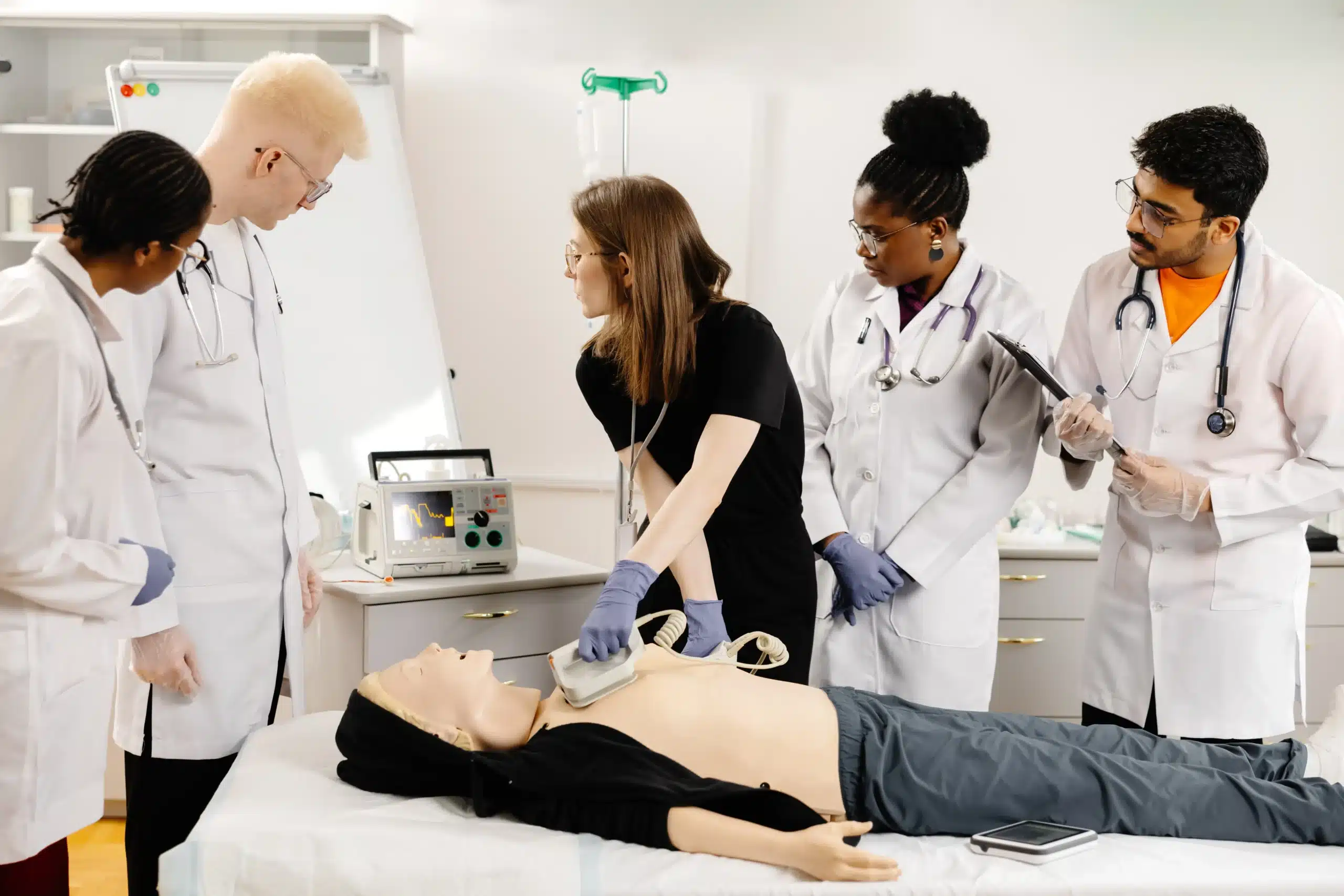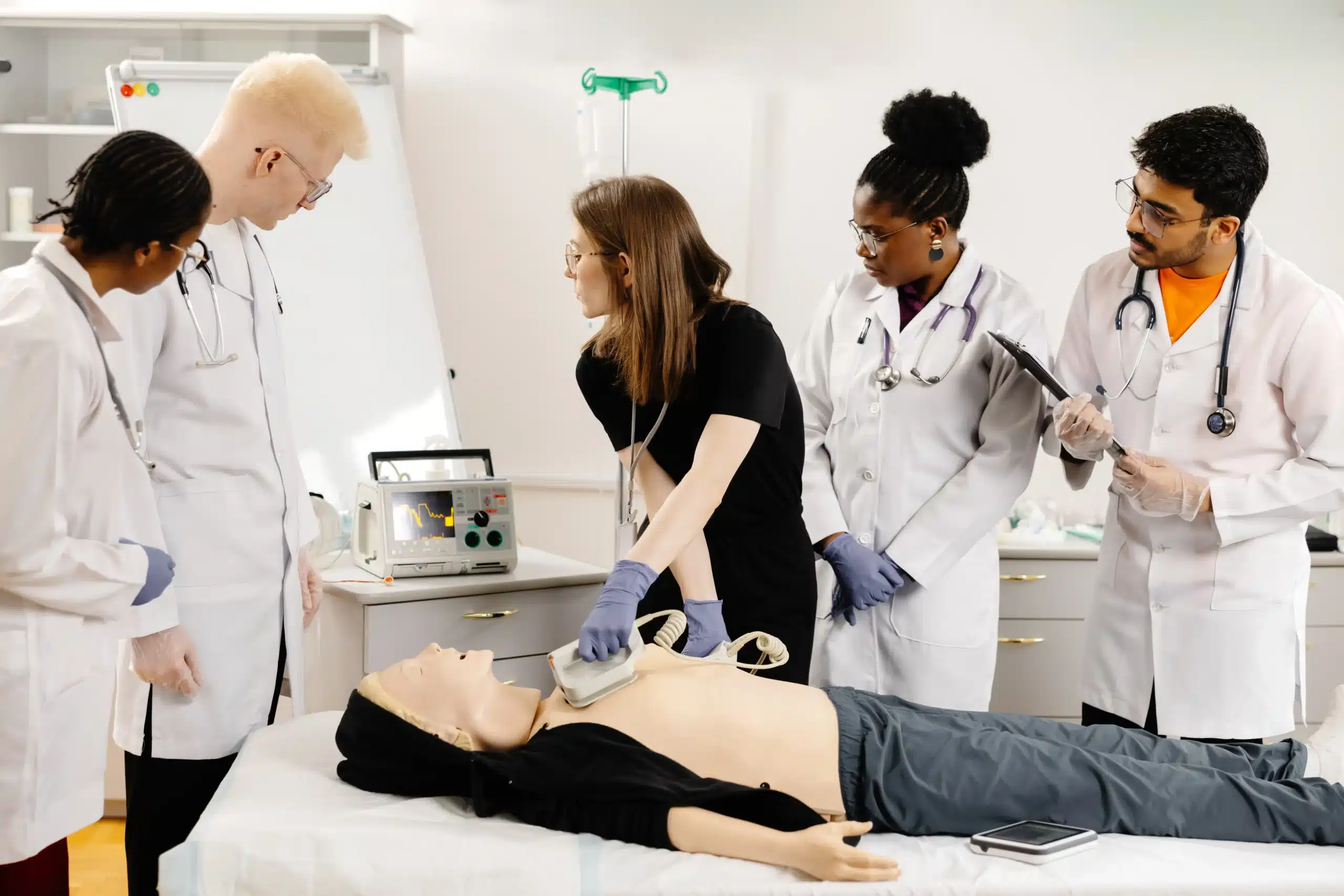Emergencies can happen anytime, anywhere. Being equipped with CPR skills can make all the difference. If you’ve been searching for “CPR courses near me,” you’re in the right place. This comprehensive guide walks you through the various CPR course options, certification levels, costs, and tips for finding quality training. We’ll also explore the different learning formats available, from in-person classes to online and blended learning, so you can find a course that fits your lifestyle. Let’s empower you to be prepared for anything.
Key Takeaways
- Choose the right CPR course: Determine your needs based on your profession and required certification (BLS, ACLS, PALS, etc.). Select a learning format (in-person, online, or blended) that fits your schedule and preferences.
- Understand associated costs: Course prices vary; explore options like group discounts and blended learning to save. Factor in any extra certification fees when budgeting.
- Prioritize quality training: Select reputable providers offering AHA-certified courses and experienced instructors. Consider class size and comprehensive course content for optimal learning.
What are My CPR Course Options?
Choosing the right CPR course depends on your specific needs and goals. This section breaks down the different types of CPR courses, learning formats, and certification levels available, so you can find the perfect fit.
CPR Course Types
CPR and first-aid training are essential life skills. Vacaville CPR Classes offers American Heart Association (AHA) certified courses that equip you with the knowledge and skills to respond effectively in emergencies. These courses cover a range of topics, from basic life support to first aid for common injuries. Whether you’re a healthcare professional, a childcare provider, or simply someone who wants to be prepared, there’s a course designed for you. For those in Vacaville, AHA-certified CPR and first-aid courses are readily available through Safety Training Seminars.
In-Person, Online, or Blended Learning?
CPR training is offered in various formats to accommodate different learning styles and schedules. In-person classes provide hands-on instruction and direct interaction with instructors. Online courses offer flexibility, allowing you to learn at your own pace from anywhere with an internet connection. Blended learning combines the best of both worlds, offering online coursework supplemented by in-person skills sessions. CPR Class Today, for example, offers this blended learning format for CPR courses, making it easier to fit training into a busy schedule. Consider which format best suits your learning preferences and availability.
Certification Levels: BLS, ACLS, PALS, & More
Different CPR certifications cater to various levels of expertise and professional requirements. Basic Life Support (BLS) certification is often required for healthcare providers and those in related fields. Explore the range of BLS courses available in Vacaville, including online and blended learning options. Advanced Cardiovascular Life Support (ACLS) and Pediatric Advanced Life Support (PALS) certifications are geared towards healthcare professionals who manage more complex cardiac and respiratory emergencies. A combined CPR/First Aid course provides comprehensive training for various situations. Choosing the right certification level depends on your career goals and the level of responsibility you anticipate in emergency situations.
How Much Does CPR Certification Cost?
CPR certification costs vary depending on several factors, including the course type, provider, and any additional fees. Understanding these factors can help you budget for your training and find the best value.
Average Course Prices
Basic CPR/AED training combined with First Aid typically costs around $110, though you can sometimes find it for around $85. If you only need CPR/AED training, expect to pay around $55. A shorter, two-hour course focusing on CPR and AED usage averages around $35 per person. Keep in mind that this shorter training usually doesn’t include official certification, which often comes with a separate fee. For more detailed pricing, check out local providers like ABC Health and Safety Training.
Considering Additional Fees
Beyond the course itself, factor in potential extra costs. Some providers charge a one-time certification fee, which can range from $25 to $35 depending on the certification level (CPR/AED/First Aid or BLS Healthcare Provider). Always check with the training center to understand the full cost before you commit.
Finding Discounts & Group Rates
If cost is a concern, look for providers offering discounts or group rates. Safety Training Seminars often has discounts for group bookings, making it a smart choice for families, businesses, or community groups. Some providers also offer blended learning courses, combining online instruction with in-person skills sessions. This format can be more affordable and flexible for busy schedules. You can explore various CPR and first-aid training options and learn more about CPR costs at Fairfield CPR Classes.
How Can I Find Quality CPR Training?
So you’re ready to learn CPR—that’s fantastic! Choosing the right course is a big decision. Here’s what to look for to ensure you receive high-quality training:
Instructor Qualifications & Experience
First, check the instructor’s credentials. Are they certified by a nationally recognized organization like the American Heart Association (AHA)? Do they have a medical background? Experienced instructors bring real-world knowledge to the classroom, and their expertise can make a big difference in your learning. Also, consider class size. Smaller classes often allow for more personalized instruction and feedback, which can be especially helpful for hands-on learners.
Accreditation & Recognition
Look for CPR courses accredited by reputable organizations like the AHA. The AHA is a leader in CPR and emergency cardiovascular care, setting the standards for training and certification. Choosing an AHA-certified course ensures your training aligns with the latest guidelines. Vacaville CPR Classes offers AHA-certified courses, so you can be confident you’re receiving high-quality training that meets national standards.
Course Content & Guidelines
A quality CPR course should cover a comprehensive range of topics. Beyond CPR basics, look for courses that include first aid and certification in Basic Life Support (BLS), Advanced Cardiovascular Life Support (ACLS), Pediatric Advanced Life Support (PALS), or Neonatal Resuscitation Program (NRP), depending on your needs. Make sure the course content aligns with current AHA guidelines so you’re learning the most effective techniques. Learn more about these courses.
How Long is My CPR Certification Valid?
So, you’re ready to get CPR certified—that’s fantastic! You’re probably wondering how long your certification will last. It’s a common question, and the answer is key to ensuring you’re always prepared for an emergency.
Certification Duration
CPR certifications are typically valid for two years. This can vary based on the certifying organization and the specific type of training. Always double-check with your chosen provider, like the American Heart Association, to confirm the exact duration. Some healthcare providers may require their staff to recertify annually.
Renewal Requirements & Continuing Education
When your certification nears its expiration date, you’ll need to renew it to stay current. Renewal usually involves a refresher course that covers the latest guidelines and techniques. This ensures your skills and knowledge remain sharp. The American Heart Association offers Basic Life Support (BLS) certification courses that cover these essential, life-saving skills and provide a pathway for recertification. Check with your certifying organization for specific renewal requirements. You can also explore options like RQI classes for maintaining your skills.
Keeping Your Skills Current
Even with a valid certification, regularly reviewing the material and practicing is crucial. Skill retention can decline after just a few months. Think of it like any other skill—consistent practice is key. Set reminders every few months to refresh your memory on key procedures. You can find helpful refresher materials online or through your local training provider, like Vacaville CPR Classes. Staying proactive about maintaining your skills will boost your confidence in a real-life emergency. Don’t forget to check out any low price guarantees or group discounts available in your area.
How Do I Choose the Right CPR Course?
Choosing the right CPR course can feel overwhelming with so many options available. But by breaking it down into a few key steps, you can find the perfect fit for your needs and goals.
Assess Your Needs & Goals
Before you start searching for CPR classes, ask yourself why you want to get certified. Are you a healthcare professional who needs ACLS or PALS certification? Or are you a teacher, parent, or childcare provider looking for basic CPR and first-aid training? Understanding your needs will narrow your options considerably. For example, advanced certifications like ACLS and PALS are designed for healthcare providers, while basic life support (BLS) certification is suitable for a broader range of individuals. Consider also your workplace requirements—some professions require specific certifications.
Compare Local Training Providers
Once you know what type of training you need, compare local providers. Look for training centers offering the certifications you require. Consider factors like class schedules, location, cost, and instructor experience. Reading online reviews can also offer valuable insights. If you’re in the Vacaville, Dixon, or Fairfield area, Vacaville CPR Classes is a woman-owned, American Heart Association (AHA) Training Center offering a variety of courses. Don’t forget to check if the training center is accredited by a recognized organization like the AHA.
CPR Course Providers Near Vacaville
To help you in your search, here are a few CPR course providers near Vacaville:
Vacaville CPR Classes
Vacaville CPR Classes offers AHA-certified courses in BLS, ACLS, PALS, CPR, and first aid. They also provide group discounts and convenient daily classes. Their focus on customer service and flexible scheduling makes them a popular choice.
American Heart Association
The American Heart Association offers various CPR and first-aid courses, including BLS, Heartsaver CPR/AED, and First Aid. They are a nationally recognized authority on CPR training and provide the latest guidelines and best practices.
Red Cross
The Red Cross also provides CPR and first-aid training courses. Check their website for local class offerings and schedules. Their courses cover a range of topics, from basic first aid to lifeguard training.
National CPR Foundation
The National CPR Foundation offers online CPR and first-aid certification courses. This can be a convenient option if you prefer self-paced learning or have a busy schedule. Make sure to verify if their online certifications meet your specific requirements.
ProCPR
ProCPR offers various CPR and first-aid courses suitable for both healthcare professionals and the general public. They provide flexible training options to meet diverse needs and offer courses in various locations.
CPR Today
CPR Class Today focuses on AHA-certified training for CPR, ACLS, BLS, AED, and first aid. They prioritize providing high-quality, certified training programs and offer flexible scheduling options.
Related Articles
- CPR Courses in Fairfield: Your Complete Guide – Vacaville CPR Classes
- CPR Training in Fairfield: Your Certification Guide – Vacaville CPR Classes
- Online CPR Classes in Dixon: Your Complete Guide – Vacaville CPR Classes
- Why CPR is Important in Healthcare (And How You Can Learn It)
- CPR Renewal in Vacaville: Your Complete Guide – Vacaville CPR Classes
Frequently Asked Questions
What if I have no medical background? Can I still take a CPR class? Absolutely! CPR training is designed for everyone, regardless of medical experience. Many courses cater specifically to the general public, focusing on essential life-saving skills that anyone can learn and use. These courses often combine CPR with first-aid training, empowering you to handle various emergencies.
How do I choose between online and in-person CPR training? Think about your learning style and schedule. If you prefer hands-on learning and direct interaction with an instructor, in-person classes are a great choice. If you need more flexibility and prefer learning at your own pace, online courses offer a convenient alternative. Some providers even offer blended learning, combining online coursework with in-person skills sessions for the best of both worlds.
Which CPR certification is right for me? The best certification depends on your specific needs. Basic Life Support (BLS) is often sufficient for general purposes and many workplaces. However, healthcare professionals or those seeking more advanced training might consider Advanced Cardiovascular Life Support (ACLS) or Pediatric Advanced Life Support (PALS). Consider your current role and future career aspirations when making your decision.
How often do I need to renew my CPR certification? Most CPR certifications are valid for two years. It’s essential to renew your certification before it expires to maintain your skills and ensure you’re up-to-date with the latest guidelines. Check with your certifying organization or training provider for specific renewal requirements.
What if I don’t use my CPR skills often? How can I stay prepared? Even if you rarely use your CPR skills, regular practice is key to maintaining proficiency. Consider refreshing your knowledge every few months by reviewing the course materials or practicing key techniques. Many online resources and local training providers offer refresher courses or practice sessions to help you stay sharp and confident in your abilities.
